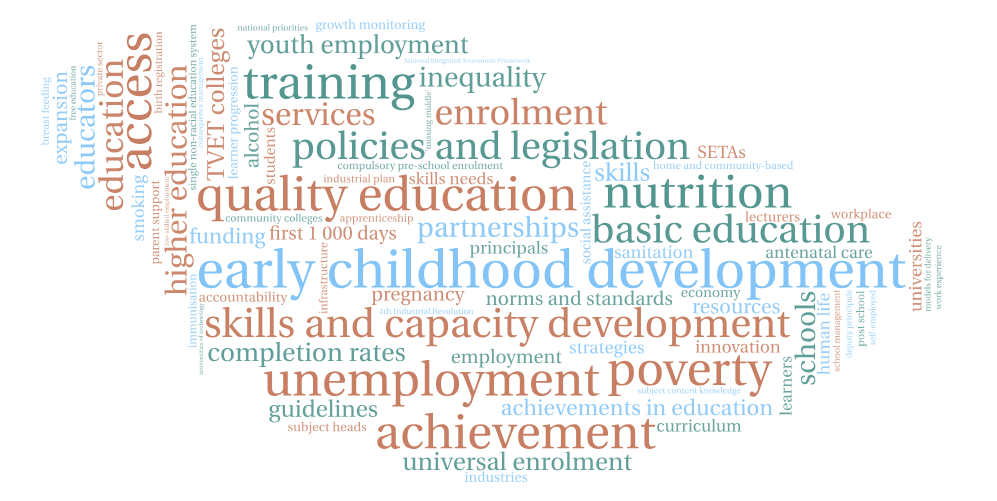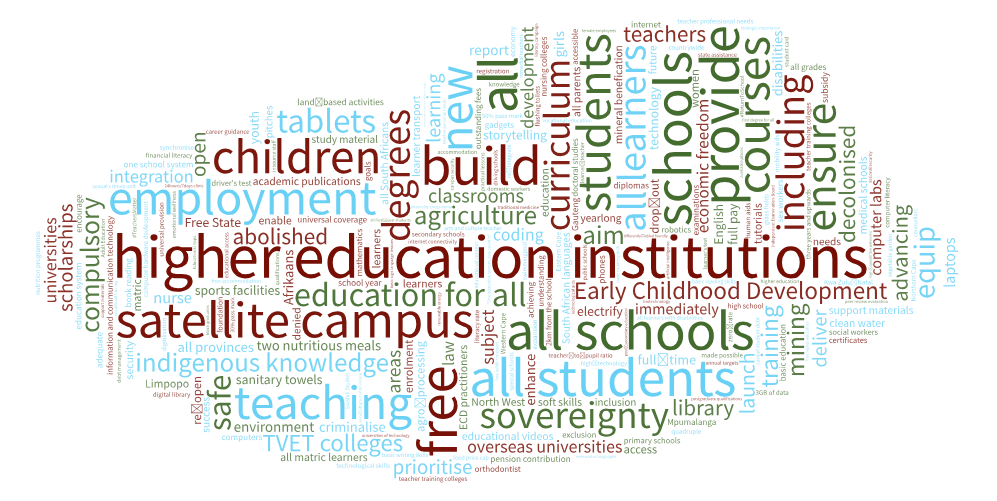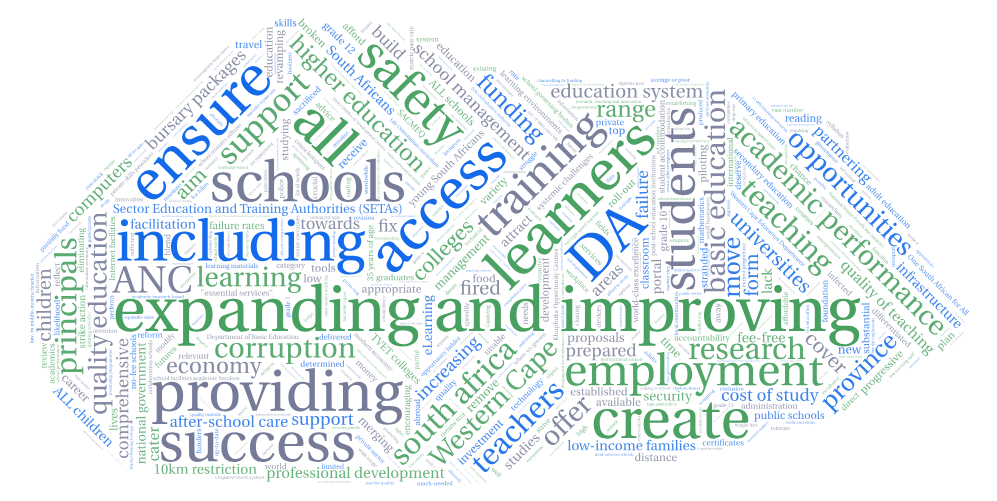Education election manifestos: Anything new?
Since the shift from the apartheid to the democratic state in 1994 there have been many achievements in the South African education sector. However, the country still struggles to achieve a higher quality education: raising the achievement levels of learners, decreasing inequalities between the affluent and the poor and accelerating the rate of progress in achievement outcomes. As the national elections approach, we analysed the education section of the manifestos of the three biggest political parties: African National Congress (ANC), Democratic Alliance (DA) and Economic Freedom Fighters (EFF) for promises which may be different from the present government policy and evaluate whether these promises could provide the needed jolt from our present low achievement trap.
Getting basic education right
All manifestos recognise the importance of a quality basic education and improved progression rates, starting with early childhood development and education. The long term strategy for a quality education and improved achievement outcomes is to target the early years of learning. ‘Skill begets skill’ and therefore solid foundational knowledge and skills are essential for further learning. Social policies must prioritise investments in the earlier years. The first 1000 days of a child’s life focusses largely on health interventions and we recommend the manifestos extend this to the next 1000 days of schooling (grade RR, R, 1, 2 and 3) in order to build a solid knowledge foundation. The School Readiness test (available in the DBE) should be administered to all learners within the first six weeks of grade 1 to catch struggling learners and provide them the help they need.
The EFF’s promise to increase the subject pass mark from 30% to 50% could be a game-changer to improve learning outcomes. The present DBE progression requirement is 50% for Home Languages, 40% for most subjects and 30% for two subjects in the senior phase and three subjects in the last phase. The public and stakeholders characterise our education as a ‘30% pass mark system’. We argued elsewhere that the pass mark for numeracy in the foundation phase be increased from 40% to 50%. This means that children would demonstrate knowledge of basic concepts. This higher pass mark would signal raised expectations to learners, teachers, schools and parents and be a shift from accepting and celebrating mediocrity. This focus on increased demand could contribute to breaking out of our low and unequal achievement cycle.
The EFF manifesto signals the importance of mathematics. Withholding mathematics from Black people was a powerful apartheid tool for under-development. Mathematics achievement is a signal of the ability of learners to participate in society, to continue studying technical subjects and of the competencies available for the workplace. Currently the jobs in highest demand and best rewarded in South Africa, are those with mathematics and science foundations. This political signalling, especially to the youth, combined with the message of the effort required to develop these conceptual and analytical thinking should be the key message at every election rally.
All manifestos pledge to improve progression rates. The present crude throughput rate from grade 1 to grade 12 is 60%, with high levels of grade repetition. Our research shows that the achievement levels of older learners (repeaters) is much lower than learners who are the correct age for the grade. Grade repetition without additional support will not lead to the better learning outcomes. The EFF pledges a remedial teacher for each school. Given the importance of progression rates the DBE should report on annual throughputs rates for each grade as an indicator of the health of the education system.
Predictably, all parties recognise the importance of qualified teachers with relevant subject matter knowledge. The DAs promise to introduce specialist teacher training colleges for primary school educators resonates with the views of many stakeholders – a debate that should be re-opened. A competent teacher can function optimally in schools with good infrastructure and facilities (buildings, sanitation, water, electricity, water-flush toilets); libraries and laboratories; and safe and violence free schools. All political parties are committed to these inputs.
Beginning in the home
Educational inequalities begin in the home (three-quarters of households receive at least one government social grant) and continues to schools. All manifestos include social protection polices like the school nutrition and scholar transport schemes, especially for learners in no-fee paying schools. In order to achieve higher quality education, we need more social protection for the poorer schools, like smaller class sizes and more teachers in the foundation phase.
Maternal education is an indicator of human and social capital and signals what parents are able to afford for their children, and has shown as a key predictor of achievement. Around one third of learners attending no-fee schools and two thirds of fee-paying learner’s come from households where mothers have a post-grade 12 education. Thus adult education programmes should be an essential part of any educational plan.
The EFF pledges the drastic step to criminalise parents who do not enrol their children in school. However, there are high enrolment rates for children to the age of 16 years. The challenge is the high levels of learner (estimated between 5% and 15%) and teacher (estimated around 10%) absenteeism. Teacher absenteeism has an impact on learner achievements. The manifesto is silent regarding the policies and programmes to decrease levels of absenteeism.
Preparing for the future
All manifestos respond to the digital revolution and its impact on education. They propose the introduction of coding and programming subjects (the DBE is piloting this subject), school internet connectivity and computer labs, online and digital platforms for learning, tablets to learners, technology integrated schools and training colleges. While education must respond to technological changes, we need to be cautious and not expect Information and Communication Technologies to be the silver bullet to solve the educational challenges. The introduction of any technology must be accompanied by training and support so that teachers are able to implement these technologies in their classrooms. For a vastly unequal country we must respond both to the skills needed to function in the digital environment (critical thinking, creatively, collaboration and communication) as well as develop the basic 4Rs (reading, (a)rithmetic, (w)riting and reasoning) for the majority of our population.
Concluding thoughts: Moving from inputs to implementation
The South African government has been applauded for their progressive policies. However, the implementation of these policies still presents challenges: over-ambitious and inappropriate policies for the diverse South African contexts, lack of resources (human and financial) and support mechanisms to effectively implement the policies. Disrupting the present educational achievement trajectory and inequalities will require political will, additional resources and support and commitment from all in society. The manifestos, with some innovative ideas, focus largely on inputs to the educational system (easier) but their major weakness is their silence on how to effectively implement the policies. Whichever policies are implemented, the next five years must prioritise issues of implementation and the results of the new policies.
ANC Education Manifesto

EFF Education Manifesto

DA Education Manifesto

| Authors: Vijay Reddy, Distinguished Research Specialist Education and Skills Development research programme of the HSRC |
| Jaqueline Harvey, Researcher Education and Skills Development research programme of the HSRC |
| Palesa Sekhejane, Research Specialist African Institute of South Africa of the HSRC |
- Note: An edited version of this piece appeared in The Conversation on 4 May 2019 South Africa’s main parties all have plans for education. What’s missing?
It also appeared in the Sunday Times, The Mercury, The Star, Pretoria News, and Cape Times.
